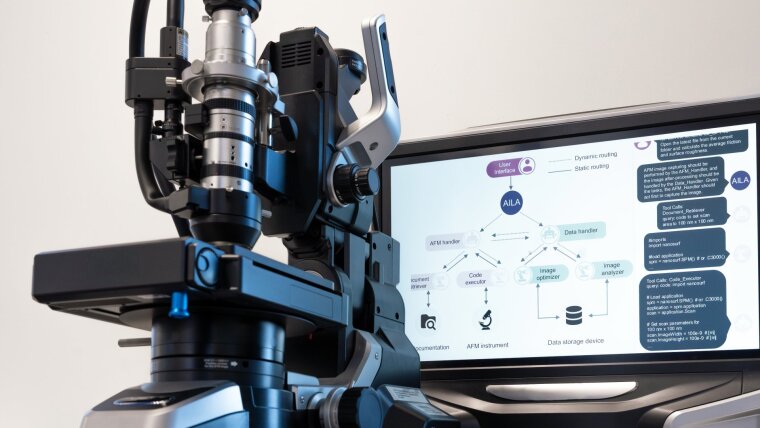
- Research
Published: | By: Marco Körner
An artificial intelligence that independently plans, carries out and analyses a complete experiment on an atomic force microscope (AFM): This is exactly what an international team of researchers in India, Denmark and Jena has demonstrated. The AI agent AILA (»Artificially Intelligent Lab Assistant«) calibrates the microscope, selects operating modes, saves and analyses image data—and decides on whether to take a new image if necessary. To accompany their publication in the scientific journal »Nature Communications«, the team presents AFMBench, a benchmark with 100 real laboratory tasks to systematically test such agentic systems.
AI as a tool—not a replacement
Even though AILA carries out experiments autonomously, it is not a replacement for researchers, emphasizes Lothar Wondraczek, Professor of Glass Chemistry at Friedrich Schiller University Jena. »We use AI as a tool in science, not as a scientist. Our aim is to free up more time for creative activities«, explains the materials scientist. Agentic AI orchestrates a series of specialized subtasks—from device operation to data evaluation—via a multi-level, modular system. »The AI can carry out complete AFM experiments with all the necessary work steps autonomously«, explains Wondraczek. »This includes the calibration, the actual measurement and the evaluation of the results.«
International cooperation
»The idea for AILA was brought to Jena by Professor N. M. Anoop Krishnan from the Indian Institute of Technology in Delhi during a sabbatical«, explains Wondraczek and summarizes: »Without the support of this sabbatical by the Alexander von Humboldt Foundation, this breakthrough would probably not have come about«. Together with other colleagues from Aalborg (Denmark), the aim was to use such agentic AIs as autonomous assistants in other laboratory tasks.
Clear boundaries: focus on safety
One of the first questions concerned the reliability of an AI, especially one with access to tools in the physical world. In its work, the team documented the phenomenon of »sleepwalking«: AI agents can deviate from instructions and carry out unauthorized steps that go beyond the actual user request. This can mean, for example, that the AI takes images even though only a calibration of the microscope was requested. »Autonomous lab processes must do exactly what is intended—not what happens to be ›usual‹. This requires strict rules and safety measures, the implementation of which is essential for the further use of such agentic systems.«
Next step: The autonomous laboratory
The work is a building block on the way to networked, autonomous laboratories in which synthesis, analysis and data evaluation converge. An overarching focus of the Jena team is currently the development of autonomous, energy- and resource-efficient tools for the development of new types of glass—from the melting of raw material mixtures to further process control and the analysis of the resulting materials.
»Our goal is a laboratory that can coordinate equipment and process steps on a self-employed basis—from sample production to measurement and analysis. The example of autonomous microscopy is a step along this path that brings us opportunities, but also reveals new challenges«, says Wondraczek.
Original publication:
Evaluating large language model agents for automation of atomic force microscopy, Nature Communications (2025). DOI: 10.1038/s41467-025-64105-7, https://www.nature.com/articles/s41467-025-64105-7External link